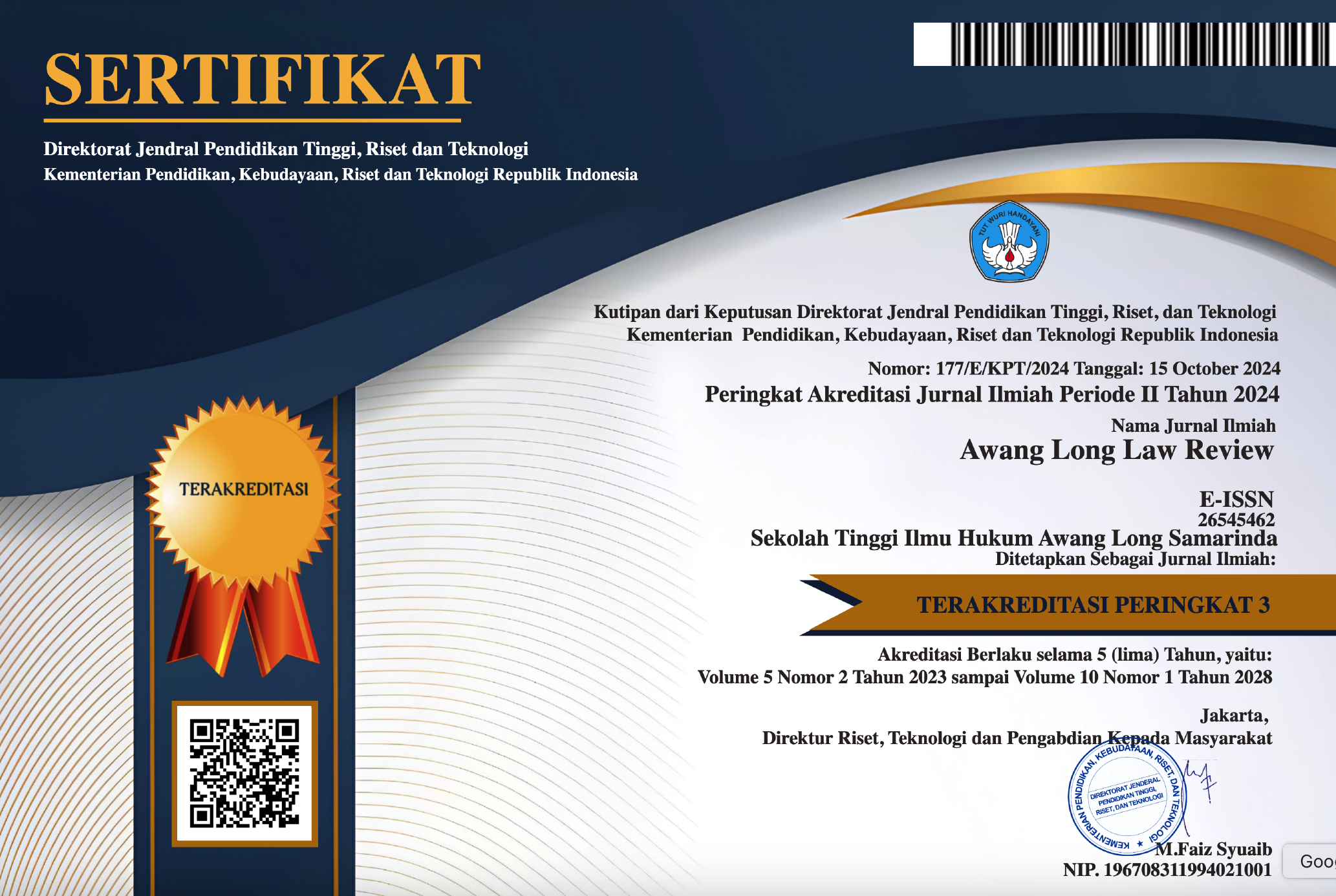CARBON TAX REGULATION IN INDONESIA: A COMPARATIVE REVIEW WITH SINGAPORE
Abstract
Climate change presents an urgent global challenge, prompting countries to adopt emission reduction strategies in accordance with the Paris Agreement. One such strategy is the implementation of a carbon tax to reduce greenhouse gas emissions and promote sustainable development. Indonesia and Singapore, as signatories to the Paris Agreement, have both introduced carbon pricing policies with differing legal and institutional frameworks. This study analyzes and compares the carbon tax regulations in Indonesia and Singapore to evaluate their alignment with climate commitments and identify practical lessons for Indonesia. The objective of this research is to examine the carbon tax regulations in both countries and identify aspects of Singapore's carbon tax policy that could serve as a lesson for Indonesia in formulating a more effective policy. This study employs a normative juridical method with a comparative approach and a statutory approach. The findings indicate that Indonesia’s carbon tax, introduced through Law Number 7 of 2021, represents an initial step toward achieving national climate targets. However, the policy is still limited in scope and lacks certainty in rate progression, coordination between institutions, and enforcement mechanisms. Conversely, Singapore’s Carbon Pricing Act 2018 provides a more structured and transparent system. It includes specific emission thresholds, gradually increasing tax rates, centralized reporting, and strict enforcement backed by legal sanctions. Therefore, Indonesia can draw lessons from Singapore in terms of policy design, institutional framework. These include establishing a clear carbon tax roadmap, improving inter-agency coordination, developing a centralized monitoring and reporting platform, and implementing firm sanctions for non-compliance.
Downloads
References
Aisyah, A., Rizky, F. K., Laksamana, B., & Al Fajar, M. D. (2022). Diseminasi Hukum Penanganan Perubahan Iklim dan Pemanasan Global Ditinjau Berdasarkan Perspektif Hukum Lingkungan Internasional di Kelurahan Padang Bulan Selayang I Kecamatan Medan Selayang. Community Development Journal: Jurnal Pengabdian Masyarakat, 3(3), 1401-1411.
Amin, Rahman. 2019. Pengantar Hukum Indonesia. Deepublish, Yogyakarta.
Arief, Barda Nawawi. (2014). Masalah Penegakan Hukum dan Kebijakan. Hukum Pidana dalam Penanggulangan Kejahatan. Jakarta: Kencana Prenada Media Group. Darwin.
Atahilah Restu Ilahi, &Kusmono. (2023). Studi Pajak Karbon UU HPP Berdasarkan Asas Kepastian, Keadilan, dan Kebermanfaatan. Jurnal Pajak Indonesia, 7(2), 1–10.
Chng, K., & Ong, K. W. (2021). The Singapore Green Plan 2030: Analysing its implications on law and the legal industry in Singapore. Environmental Law Review, 23(4), 336-343.
Direktorat Jenderal Pajak. (2025). ‘Pajak Karbon, Solusi Pendanaan APBN yang Berkelanjutan?’. https://pajak.go.id/id/artikel/pajak-karbon-solusi-pendanaan-apbn-yang-berkelanjutan
Ikatan Konsultan Pajak Indonesia. Singapura Terus Naikan Pajak Karbon, PungutannyaCapai S$ 80/Ton di Tahun 2030. https://ikpi.or.id/en/singapura-terus-naikan-pajak-karbon-pungutannya-capai-s-80-ton-di-tahun-2030/
Indonesia. (2021). Law Number 7 of 2021 on the Harmonization of Tax Regulations.
Indonesia. (2016). Law Number 16 of 2016 on the ratification of the Paris Agreement ToThe United Nations Framework Convention On Climate Change (Paris Agreement To The United Nations Framework Convention On Climate Change)
Iqbal, S., & Diana, S. (2024). Predicting Optimal Tariff of Indonesia’s Carbon Tax: A Reflection on Japan and Singapore. International Journal of Social Science and Business, 8(4), 541-556.
Kumala, R., Ulpa, R., & Rahayu, A. (2021). Pajak Karbon: Perbaiki Ekonomi dan Solusi Lindungi Bumi. In Prosiding Seminar STIAMI, 8(1), 66-73.
Köppl, A., & Schratzenstaller, M. (2023). Carbon taxation: A review of the empirical literature. Journal of Economic Surveys, 37(4), 1353-1388.
Maghfirani, H. N., Hanum, N., & Amani, R. D. (2022). Analisistantanganpenerapanpajakkarbon di Indonesia. Juremi: Jurnal Riset Ekonomi, 1(4), 314-321.
Marzuki, Peter Mahmud. (2010). Penelitian Hukum, Jakarta: Kencana Prenada
Metcalf, G. E. (2021). Carbon taxes in theory and practice. Annual Review of Resource Economics, 13(1), 245-265.
Muhammad, Abdulkadir. (2004). Hukum dan Penelitian Hukum. Bandung: PT. Citra Aditya Bakti.
Mukti Fajar, N. D., & Achmad, Y. (2010). Dualismepenelitianhukum: normatif&empiris. Pustaka pelajar.
Nasution, B.J. (2008). Metode PenelitianIlmu Hukum, Penerbit Mandar Maju, Bandung.
Nofansya, A., Sari, D. S., & Yulianti, D. (2023). Implementasi Perjanjian Paris dalam Kebijakan Luar Negeri Indonesia. Padjadjaran Journal of International Relations, 5(1), 75-90.
Pamungkas, B. N., Negara, P. K., Vissia, S., &Haptari, D. (2022). ANALISIS SKEMA PENGENAAN PAJAK KARBON DI INDONESIA BERDASARKAN UNITED NATIONS HANDBOOK MENGENAI PENERAPAN PAJAK KARBON OLEH NEGARA BERKEMBANG. Jurnal Pajak Indonesia, 5(2), 357–367.
Renata, E., Laoli, P. E., & Paranduk, M. M. (2024). PRESEDEN HIJAU: STRATEGI CERDAS PENERAPAN PAJAK KARBON INDONESIA UNTUK MENGATASI EMISI KARBON. ProsidingSeNAPaN, 4(1), 53–65.
Salsabila, A. P., & Sitabuana, T. H. (2023). Urgensi Penerapan Pajak Karbon Berdasarkan Undang-Undang Harmonisasi Peraturan Perpajakan. Nusantara: Jurnal Ilmu Pengetahuan Sosial, 10(5), 2342-2351.
Selvi, S., Rahmi, N., &Rachmatulloh, I. (2020). Urgensi penerapan pajak karbon di Indonesia. Jurnal Reformasi Administrasi: Jurnal Ilmiah untuk Mewujudkan Masyarakat Madani, 7(1), 29-34.
Singapore. (2018). Law Number 23 of 2018 on the Carbon Pricing Act.
Syadesa, Anida Herdona. (2022). DDTCNews. https://news.ddtc.co.id/berita/internasional/36172/dianggap-sukses-tekan-emisi-singapura-kembali-naikkan-pajak-karbon
Tseng, Sean. (2022). Appraising Singapore's Carbon Tax Through the Lens of Sustainability. NUS Asia-Pacific Centre for Environment Law Working Paper 22/01.
United Nations. (2015). Paris Agreement. United Nations Framework Convention on Climate Change.
United Nations Framework Convention on Climate Change, What is the Paris Agreement?,https://unfccc.int/process-and-meetings/the-paris-agreement
Yeremy, J., Irawan, J., & Wimala, M. (n.d.). Kajian Penerapan Carbon Tax pada Industri Konstruksi di Singapura dan Indonesia. RekaRacana: Jurnal Teknik Sipil, 8(1), 42–51. https://doi.org/10.26760/rekaracana
Yuliartini, N. P. R., & Suwatno, D. S. R. (2022). Ratifikasi Terhadap Traktat Persetujuan Paris (Paris Agreement) sebagai Wujud Implementasi Komitmen Indonesia dalam Upaya Mitigasi dan Adaptasi Perubahan Iklim. Jurnal Pendidikan Kewarganegaraan Undiksha, 10(2), 328-340.
Copyright (c) 2025 Salsabila Yasmin Qanita, Diani Sadiawati

This work is licensed under a Creative Commons Attribution-ShareAlike 4.0 International License.







